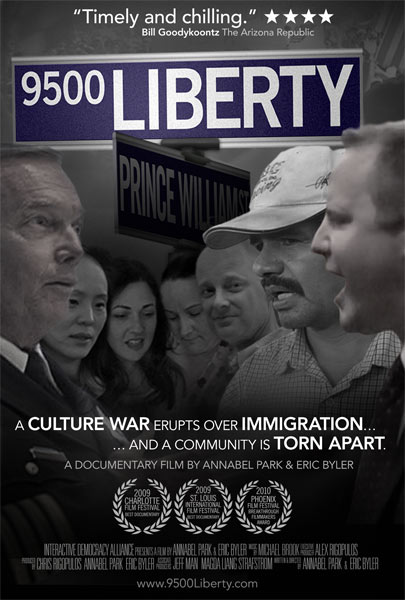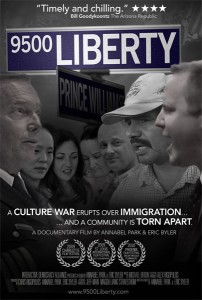When former US Speaker of the House Tip O’Neill coined that famous phrase, he wasn’t really talking about immigration policy. But as filmmakers Eric Byler and Anabel Park discovered while making their documentary “9500 Libterty,” local politics can tell us a lot about the nation as a whole.
Just what is the issue with illegal immigration? What do our immigration laws say anyway?
While some state and local laws are emerging relating to immigration, the United States Code Section 1325, Title 8, provides for a civil penalty and imprisonment for any immigrant who: (1) enters or attempts to enter the United States at any time or place other than as designated by immigration officers, or (2) eludes examination or inspection by immigration officers, or (3) attempts to enter or obtains entry to the United States by a willfully false or misleading representation or the willful concealment of a material fact.
The first time this code section is violated, the violator can be imprisoned for up to 6 months. The second and subsequent offense can result in 2 years in jail. Any deportation is decided in removal proceedings under Federal Law. And the civil penalty? Well, it’s pretty steep–at least $50 but not more than $250 for each entry.
As we all know, over the years, the Federal Law just hasn’t been enforced. And there’s a good and even embarrassing reason for that mainly based on economics. It took the horrific events of 9/11 to prioritize the issue in the nation’s collective psyche. The idea was that if we don’t tighten up our borders, dangerous terrorists would come into the country. And while there is truth to that assertion, and more enforcement of existing laws should probably occur, the fact is that the vast majority of people entering the United States in violation of Federal Law are not criminals.
“9500 Liberty” is a film that may have started as an objective take on a local conflict with national implications, but for its filmmakers, who clearly take a position against the local ordinance at issue, it became a cause celebre. The film chronicles the adoption of an immigration resolution by the elected officials of Prince William County, Virginia. That resolution would require police officers to question anyone they have “probable cause” to suspect is an undocumented immigrant.
The reaction to this immigration resolution was torrid. The large Hispanic population in the community, which included those whose residence in the US was in violation of Federal Law, became justifiably frightened. While the penalty in terms of jail time under the Federal Code might be small, if discovered as undocumented would the Federal Government deport them? And would anyone who appeared to be Hispanic now be profiled by local authorities?
Byler and Park started recording the event as it transpired, at first staying at arm’s length. Interviews were conducted with both sides. Much time was spent early in the film with conservative blogger Greg Letiecq, the leader of the movement in favor of the immigration resolution. An articulate and charismatic guy, Letiecq is not depicted as a kook. His positions seem reasonable. But as the story moves forward, it is revealed that his blog, HelpSaveManassas.org, contained blog entries revealing the inherent prejudice in the immigration resolution. It is safe to say that Byler and Park were able to show that the driving force behind the resolution was an anti-Hispanic attitude.
It is one thing to support a tightening of border security and enforcement of immigration laws, but it is another to advocate the breaking up of families through the forced deportation of otherwise law-abiding citizens who pose no threat to the US. In fact, “9500 Liberty” shows that there might be a link between the economic hardship that the county experienced and the mass exodus of undocumented immigrants once the law in the county took effect. Sure the link is hardly scientific but the connection is hard to ignore. Even crime went up as the law took effect. Whatever the reason, the resolution certainly did not have the officially intended effect. It was the unofficial reasons for it in the first place that bubbled to the surface in days after its passage.
Eric Byler co-directs “9500 Liberty” with his partner Anabel Park. I’m familiar with Byler’s work and this is his first feature in the documentary genre. Previously, he has made movies, like his excellent “Charlotte Sometimes,” that explore Asian-American issues. This departure into nonfiction filmmaking is a very good move and I hope to see more of it. Certainly it helps to have such a talented partner in Park, whose background in grass-roots political action provided an solid foundation for this film.
The interesting thing about the “9500 Liberty” production is that it might be the first feature to come directly from YouTube postings. Byler and Park started posting video they shot on YouTube before much later pulling it all together into a feature. Based on my brief survey of their YouTube channel, which contains 120 video uploads, I can only imagine the Herculean task of editing the film together. The result is a very coherent and moving film, a story that will resonate with all of us.
Byler and Park are self-distributing the movie. Get more information on how you can buy or see “9500 Liberty” by visiting the film’s website: http://9500liberty.com/index.html



